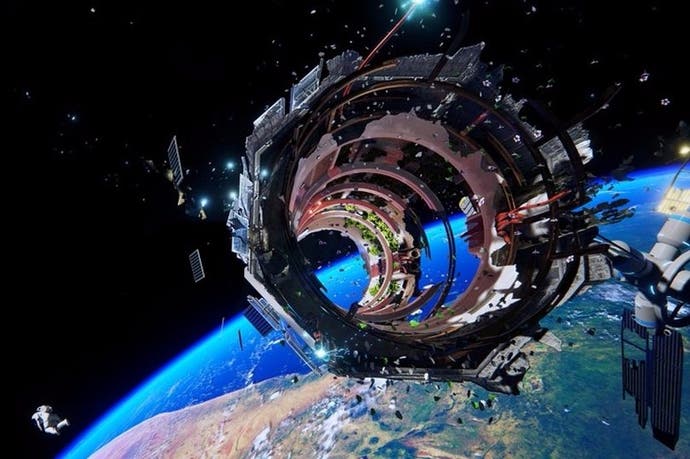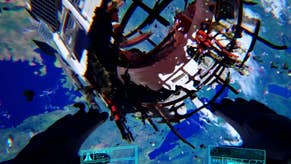How Microsoft's most-hated employee found hope in galactic disaster
Adam Orth's redemption in space.
On 4th April 2013, Adam Orth, a creative director at Microsoft Game Studios, walked through the front door of his home in Seattle and turned off his mobile phone. It was, he recalls, an "entirely ordinary day". Orth was, at the time, researching uses for the second generation of the Kinect camera, which Microsoft planned, when the time came, to sell with every Xbox One unit. One experiment, for example, facilitated live polling during a Presidential debate. The camera would distinguish between multiple individuals as they watched the TV in a room and, from hand gestures, could poll reactions and collate the results across Xbox Live.
Orth was unusually outspoken on social media for someone who worked at an organisation that requires its spokespeople to maintain an dogged level of inoffensive corporate decorum. A few hours earlier, for example, Orth tweeted a defence of Microsoft's requirement that its forthcoming Xbox One would need to be connected to the internet in order to play games. "Sorry, I don't get the drama around having an 'always on' console," Orth wrote. "Every device now is 'always on.' That's the world we live in."
Manveer Heir, a friend of Orth's, who works as a game designer on BioWare's Mass Effect series, replied: "Did you learn nothing from Diablo 3 or Sim City? You know some people's internet goes out right? 'Deal with it' is a shitty reason." When Orth countered that electricity can sometime fail too, Heir replied, "You've lived in LA, SF, Seattle... very connected places. Try living in Janesville, WI or Blacksburg, VA." Orth's final response would upend his life. "Why on earth would I live there?"
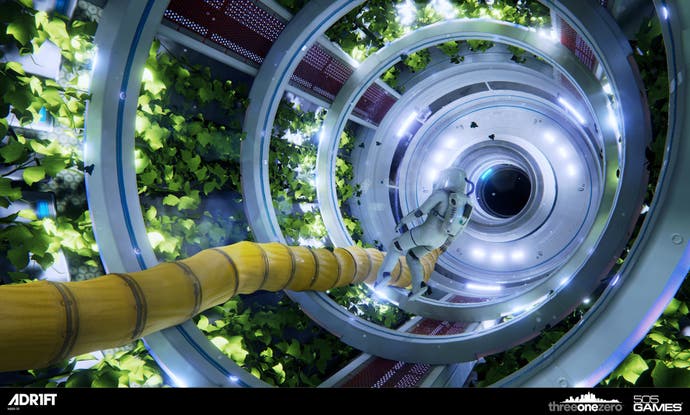
After dinner, Orth switched on his phone. A rattle of notifications caused the device to "levitate" out of his hand, as he puts it today. Three years later Orth still finds it difficult to talk about what happened next. "After that it was bad," he says, plainly, as we meet in London. "I turned everything off. I never read any of the news stories. It was too painful to go onto the internet." Orth's indiscretion, derived from a failure to appreciate that no conversation held in an online public space should be considered private, came at a delicate moment for Microsoft, whose early marketing for the Xbox One had confused many with its promotion of internet TV ahead of video games. Orth represented this upstart element of Microsoft's business, adding insult to his dismissal of Xbox owners' concerns about having to be connected to the internet at all times in order to play their games.
The internet's eye of Sauron swivelled on Orth's tweet, directing an "unbearable" cavalcade of abusive email, phone-calls and messages toward him. In the midst of such a torrent, even a message that, in another context, might have seemed reasonable appeared vicious, multiplying the psychic toll. Orth's wife assured him the storm would soon pass.
"I told her: 'That's not what's going to happen.' I knew immediately it wasn't going to be a small deal." Orth's instinct proved correct. The following day Microsoft issued a chilly apology for "the inappropriate comments made by an employee on Twitter yesterday". While Orth says that he personally heard from his employer "immediately" he still recoils from the fine detail of the memory. "We can leave it as it was a painful experience," he says. A few days later, Orth handed in his resignation, the latest example of how, in the 21st Century, a career can be ended in fewer than 140 characters.
Unemployed, toxically unemployable and still inundated with cruel messages from strangers, Orth "retreated" as he puts it, into composing an idea for a game. "I've always been fascinated with stories about sole survivors," he says. "I'd been toying with the idea for a space survival game for a while. Once I started layering the experience of what was happening to me over the conceit, everything came together." Orth showed his idea, titled Adrift (styled obnoxiously with a '1' to replace the 'I', in order, presumably, to imbue the title with search engine stickiness) to some friends, who encouraged him to take it further. It took just 30 seconds, Orth says, for his friend, Omar Aziz, a programmer on the Call of Duty series, to agree to leave his job and form a company together.
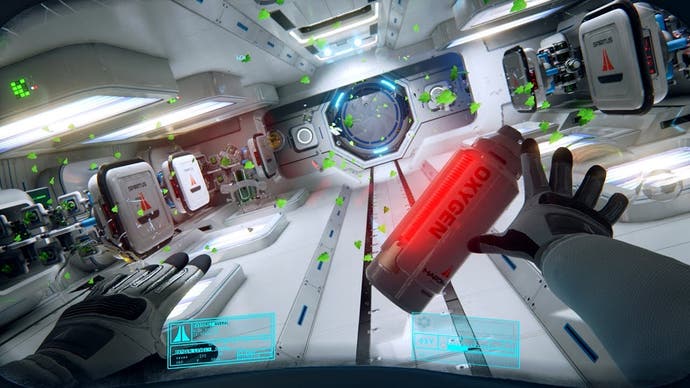
Adrift reflects the disorientation and fear that Orth felt in the days and weeks following his online shaming. The game opens in future space, depositing you among the soundless debris of a stellar catastrophe. You are the sole survivor of a wrecked and unsalvageable space station, now orbiting Earth in a constellation of jagged fragments. Your visor is cracked. Your oxygen is leaking, forcing you to replenish your supplies every minute or so from one of the tanks that pinwheels in slow motion alongside the pens, scissors and blobby water droplets that now busy the space around you. Planet Earth, outlandishly vibrant in the distance, turns, as if to turn her back toward you.
"Metaphors abound," says Orth. "'Adrift' is how I felt at that time. The destroyed space station represents my life." The game is based, he explains, around an arc of action, consequence and redemption. "That's kind of what happened to me. It's a game about how you overcome adversity, and learn from it and grow as a person. It's about having to keep moving forward. Right at the start I decided that if I was going to make a game on my own, I was going to make a personal game; I wasn't going to pull any punches when it came to my story."
Orth, who grew up in Connecticut and moved to Santa Monica, where he currently resides, entered the industry at the age of 29, “late” as he describes it. He was a gigging musician with a publishing deal, which led to an invitation to write the soundtrack to the PlayStation 2 James Bond game, Tomorrow Never Dies. Orth composed ten or so pieces of music of a few minutes each, but lost the contract to another writer. He was, however, asked whether he'd like to join the QA team working on the game, an offer that he accepted. Orth "bounced around" some QA gigs, calling Sony Santa Monica, the studio where longed to work, "every day for a year." Eventually the studio relented. "I finally got a testing gig there," he recalls. "Then David Jaffe pulled me out of the department and gave me a design job. I had to place the pick-ups in Twisted Metal Black."
Orth worked alongside Jaffe on God of War, then moved to EA to work on Medal of Honor, where he met Aziz. His CV is pricked with bright appointments including senior creative positions at LucasArts, PopCap Games and, finally, Microsoft. Orth's rapid ascent through the industry contributed, perhaps, to his outspokenness, the sense that he could speak his mind without consequence. "Going through something like that causes you to reflect on who you are as a human being," he says. "I looked at myself and saw some things that I didn't really like. Before I was quick to speak. I'm a lot more thoughtful now. The experience transformed me as a human being."
With Aziz on board, Orth founded Three One Zero and, within five weeks the pair had a prototype of the game that worked with the Oculus Rift VR helmet. The choice to cast the player as an untethered, floating astronaut is a masterstroke. It's clear that VR works best with games in which the virtual character is sat down (the driver of a racing car driver, a fighter pilot and so on); walking in-game can create an immediate disconnect in the mind between the on-screen action and the body. As a floating entity, weightless in space, the mind is fooled into believing the on-screen illusion. Orth describes the first time he tried the prototype with the helmet as "magical." When he and Aziz showed the game to prospective publishers, they would first demo the 2D screen version then, unexpectedly, the pair would pull out the Oculus Rift helmet. "Every single person said the same thing: 'holy shit'."
Early into development, Orth was carrying out research on the internet when he came across a poster for Gravity, a forthcoming film that, like Adrift, follows the journey of a female survivor of a space station disaster, as she gropes her way to safety. "It was heart-breaking," he says. "I just thought: 'Well, I gotta do something else now'." Orth's friends persuaded him otherwise. "They told me that our game would be different," he says. "After all, Gravity isn't the first space disaster movie. They were right. When the film came out I went to watch it and was relieved. It's totally different."
Adrift is luxuriously produced, with beam-sharp graphics. The soundtrack, which mixes celebrated recordings of classical pieces such as Debussy's Clair de Lune with ambient tracks composed by Orth emphasises the high-production feel. "We are capable of blockbuster game-making," says Orth, of the six-member development team (which has been supplemented by around 15 contractors who have contributed animation, art, particle effects and so on). "In a budget that equates to a relatively short game."
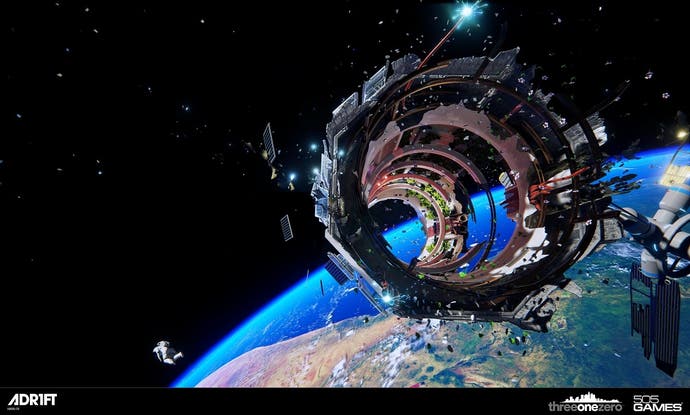
Adrift's story lasts approximately four hours, which is, regretfully, perilously short in a time when some consumers have been know to exploit Steam's liberal refund policy. "As a game-maker, it's scary to me but I get why Steam does this," says Orth. "I believe they're actually just serving a fraction of their audience. Of course I don't want people to return my game. I believe it's good value. But also, we don't want to spend our entire lives making one game. The idea is to keep games at a reasonable budget so we don't need to sell a million copies to survive in order to make another one. We're not out to buy Ferraris. We just want to keep making games."
For Orth, the broader message of the game is clear. "Never give up when you face adversity," he says. "There are a lot of personal stories in Adrift that I think people will be able to relate to, either through experiences in their own lives, or those of friends and family. I hope they take pause for a minute. It's not a hero story. It's just about people." Three years later, and he is still, perhaps, best known for his indiscretion on social media, and the retribution that he sustained as a result. "I still get it every day," he says. "That's never going to go away. Whenever articles come out about Adrift people always leave the comment 'Deal With It'. I probably shouldn't read the comments but I do anyway."
Orth has, however, found the process of making Adrift to be therapeutic. The game is not only a metaphor for what he went through, and its backstory is not only a neat frame with which to sell his vision (for one, Orth speaks with the wary precision of the ordeal survivor, not the slick ease of the marketer). Adrift is also a vehicle that has allowed him to process what happened, and, in some way, to move forward. "I've worked something through, in the process of making this game, for sure," he says. "I could have handled the controversy in many different ways. This, I think, was the best I could have done."
